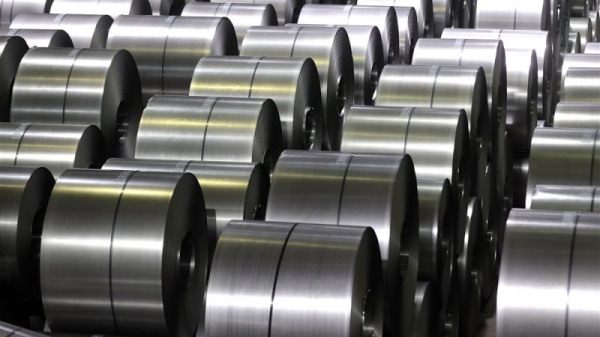Hungary aid for troubled steelmaker Dunaferr caught in EU crosshairs

State support for central Europe’s largest steelmaker, Dunaferr, which went into liquidation in December because of its ties with Russian owners, could be illegal under EU competition rules, lawyers say.
Hungary’s €42 million bailout for Dunaferr is yet to be approved by the European Commission, the EU executive told EURACTIV Slovakia, saying it was looking into the matter but had not taken a decision yet.
The Hungarian government announced in February it will pay the salaries of Dunaferr’s 4,000 employees for six months after the company filed for bankruptcy due to sanctions imposed by the European Union over its Russian ownership.
But the government’s aid to Dunaferr could prove illegal under EU competition rules, experts say.
€600 million due under EU ETS
Measures under scrutiny include special bankruptcy rules passed in December before the company went into liquidation on 5 January this year and which appear tailored to Dunaferr.
The Hungarian government also temporarily waived its claims against Dunaferr, including €600 million in fines for breaching rules under the EU Emission Trading System (ETS), the EU’s flagship climate policy tool.
According to the Hungarian Environment Ministry, Dunaferr has surrendered no CO2 allowances since 2019, even though the company is obliged to do so under the ETS to compensate for its carbon pollution.
State aid is regulated in the EU because it can give the recipient a competitive advantage over competitors in other EU member states, thereby distorting the bloc’s internal market. It can only be granted with the approval of the European Commission’s competition directorate.
According to information obtained by EURACTIV Slovakia, the Commission has yet to approve the support given to Dunaferr.
“If Dunaferr continues to produce and sell steel without having to buy and then surrender emission allowances, it gains a significant cost advantage compared to producers who operate by their legal obligations,” said Attila Kőmíves, an EU competition lawyer at Allen & Overy.
“This also undermines Hungary’s efforts to limit and reduce CO2 emissions,” he told EURACTIV Slovakia.
How the government helped Dunaferr
Dunaferr went into liquidation last year after the company became subject to EU sanctions against Russia due to its ownership structure involving Russian Bank VEB via a Cyprus-based company, Steelhold Limited.
With the jobs of around 4,000 people at risk, Prime Minister Viktor Orbán promised to find a new owner for the flailing company.
The key question is whether the insolvency rules apply selectively to Dunaferr or whether they are a general measure and thus do not constitute state aid.
The Decrees do not mention Dunaferr, but according to Kőmives, the exemptions are so limited that, in practice, there is no other company to which they could possibly apply.
Government fined but didn’t collect
Under EU rules, any operator that fails to surrender enough permits to cover its CO2 emissions is liable to pay a fine of €100 for each tonne of carbon dioxide for which the operator has not surrendered a permit.
According to Kőmíves, the Hungarian government is foregoing revenue worth €600 million from Dunaferr, including fines for ETS breach. More fines will have to be imposed for non-payment in 2022.
“Given its insolvency, it is doubtful that Dunaferr will be able to pay these costs and liabilities, which means that the Hungarian government has effectively waived them,” Kőmíves argues.
In Brussels, the European Commission confirmed that Hungary’s aid to Dunaferr was coming under scrutiny.
“Member states must lay down rules on penalties for infringements of national provisions adopted under the ETS Directive and take all measures necessary to ensure the implementation of these rules,” a Commission spokesperson told EURACTIV Slovakia.
Postponing the collection of fines may also constitute state aid. The EU Commission says in its 2016 Notice on the notion of state aid that “foregoing of state revenues is sufficient” to constitute state aid and that a “positive transfer of funds does not have to occur”.
A positive transfer of funds happened in the case of Dunaferr as the Hungarian government committed to pay staff salaries for six months. Payment from the state is not unusual in the event of a company liquidation but in the case of Dunaffer, the amount of funding provided is higher than usual.
“This measure raises the issue of selective access for Dunaferr. I am not aware of any other company whose employees would benefit from this extended guarantee,” Kőmíves said.
Next steps
The European Commission confirmed to EURACTIV Slovakia that it was looking into the matter but have not made a decision yet. Even if the state aid is issued unlawfully, the Commission may recognise its compatibility with the internal market and uphold it, the EU executive indicated.
In other cases, it can order the member state to recover the money from the beneficiary, including interest.
Hungarian commentators say that if Dunaferr were to cease operations, there would be serious social consequences. This would be bad news for Orbán’s government, which already has to deal with the highest inflation in the EU.
EURACTIV contacted the Commission with specific questions including whether Hungary had notfied them of the measures and whether they would be assessed.
A spokesperson responded that there was “no specific comment” on whether Hungary had notified them, adding it is up to member states to assess if measures involve state aid.
eurac”If a measure constitutes State aid within the meaning of EU law, it needs to be notified by the relevant Member State to the Commission for assessment, in advance of any granting of aid to beneficiaries, unless covered by block exemptions,” the spokesperson added.



